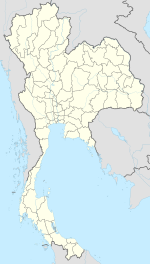geo.wikisort.org - Coast
Patong (Thai: ป่าตอง RTGS: Pa Tong,[1] pronounced [pàː tɔ̄ːŋ]) refers to the beach and town on Phuket's west coast. It is the main tourist resort on the island of Phuket, and is the centre of Phuket's nightlife and shopping. The beach became popular with Western tourists, especially Europeans, in the late-1980s. It has numerous hotels and the area has expanded into a tourist place.
Patong
ป่าตอง | |
|---|---|
Town Municipality | |
| Patong Town Municipality | |
 | |
 Patong Patong | |
| Coordinates: 7°53′35″N 98°17′54″E | |
| Country | Thailand |
| Province | Phuket Province |
| Area | |
| • Town Municipality | 16.4 km2 (6.3 sq mi) |
| • Metro | 67.09 km2 (25.90 sq mi) |
| Population | |
| • Town Municipality | 19,346 |
| • Density | 1,200/km2 (3,100/sq mi) |
| • Metro | 59,261 |
| Registered residents only | |
| Time zone | UTC+7 (ICT) |
History


Patong Beach is known for its nightlife and 2850-metre (1.77 mile) beach that runs the entire length of Patong's west side. Nightlife is centered in two main areas, Bangla Road and the "Paradise Complex", with Bangla Road being predominantly straight and Paradise Complex gay. Both are lined with many bars, discotheques, and go go bars. Prostitution in Thailand is illegal, but tolerated, as is the case in Patong.
On 26 December 2004, Patong Beach along with many other areas along the west coast of Phuket and Thailand were struck by a tsunami caused by the 2004 Indian Ocean earthquake. The wave caused a great deal of destruction to the waterfront of the beach and immediately inland and only one woman was killed in a basement seafront grocery store. Patong was one of the worst affected areas of Phuket, although the destruction was not as bad as nearby Khao Lak. Patong has largely recovered since the tsunami.
Environment
As of 2015[update] the waters off Patong Beach exceeded Thai Pollution Control Department standards for fecal coliform bacteria (FCB) and enterococci bacteria.[2]: 60 To avoid paying the municipal wastewater treatment fee of five baht per cubic meter, many households discharge their wastewater untreated into canals and the sea. Patong also has limited capacity to treat wastewater. The municipal wastewater treatment plant is nearing its capacity of 28,000 m3 a day. An upgrade be operational in 2018 which will increase capacity by an extra 9,000 m3 per day.[3]
Nightlife
Bang-la is considered as the most popular walking street in Phuket. Along the street is full of beer bars and go-go bars, which makes tourists stay there longer or in a whole night.[4]
Gallery
- Aerial view of Patong
- Patong Beach
- Songthaews, Thawiwong Rd, Patong Beach
- Patong Beach from Thanon Thawiwong
- Traffic in Patong's streets
- Jungceylon Shopping Mall
- Patong Night Market
References
- Supeepat Chongpanish, ed. (2007). ชื่อจังหวัด อำเภอ/กิ่งอำเภอ ตำบล เขต และแขวง ไทย-อังกฤษ ฉบับรับรองโดยราชบัณฑิตยสถาน / Thai-English Transcription of Changwat, Amphoe, King Amphoe, Tambon, Khet and Khwang Approved by the Royal Institute (in Thai). Bangkok: กองวิชาการและแผนงาน. กรมการปกครอง / Technical Services and Planning Division. Department of Provincial Administration. ISBN 9789747857047.
- Thailand State of Pollution Report 2015 (PDF). Bangkok: Pollution Control Department, Ministry of Natural Resources and Environment (Thailand). 2016. ISBN 978-616-316-327-1. Retrieved 5 September 2017.
- Chuennirun, Achadtaya; Wipatayotin, Apinya (28 April 2018). "Image-conscious Patong to dredge 'black' waste canal". Bangkok Post. Retrieved 28 April 2018.
- "What Makes Patong So Popular". 28 March 2019.
External links
 Patong travel guide from Wikivoyage
Patong travel guide from Wikivoyage- Patong videos
- Patong Beach video guide
Другой контент может иметь иную лицензию. Перед использованием материалов сайта WikiSort.org внимательно изучите правила лицензирования конкретных элементов наполнения сайта.
WikiSort.org - проект по пересортировке и дополнению контента Википедии






